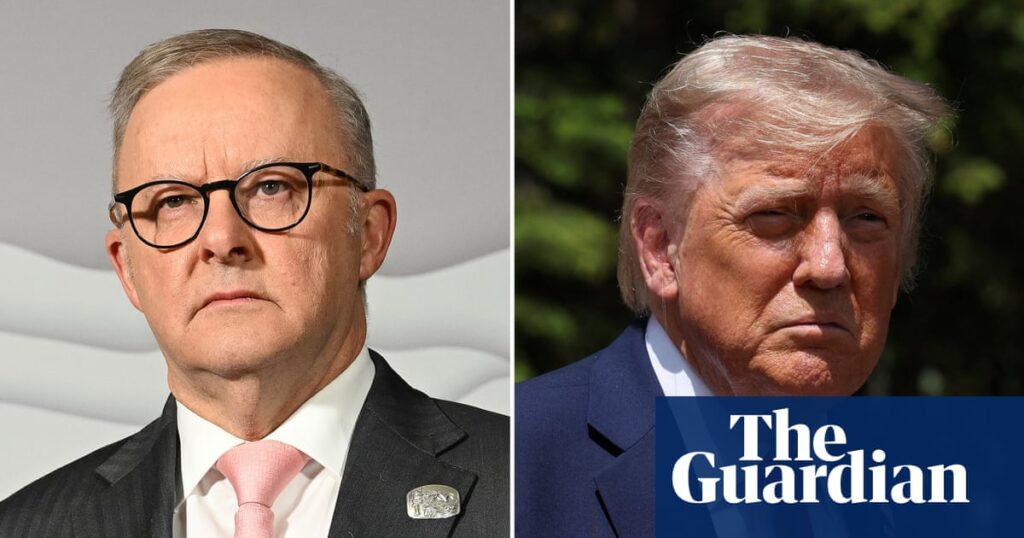Anthony Albanese is anticipating his first face-to-face meeting with Donald Trump next week.
If it goes ahead, it will be the culmination of a long and complicated process of diplomatic scheduling, according to documents obtained by Guardian Australia under freedom of information.
More than 100 pages of government communications reveal the lengths senior Australian officials went to in securing a meeting between Albanese and Trump in June, later cancelled when Trump abruptly left the G7 to attend to a conflict between Israel and Iran. The documents reveal:
-
Their meeting was locked in just days before;
-
Officials’ uncertainty over the status of the meeting;
-
The response among Australian officials when the US president cancelled meetings with Albanese and other world leaders.
The prime minister last week claimed “in the real world, no one cares” when he meets Trump – but a bevy of staff inside the departments of prime minister and cabinet (PM&C) and foreign affairs (Dfat) had worked to secure the June bilateral.
Sign up: AU Breaking News email
Three FoI requests to the foreign minister’s office, Dfat and the prime minister’s department returned 103 pages of correspondence related to the meeting slated for Kananaskis, Canada. Nearly all correspondence was redacted by the departments under Freedom of Information Act exemptions allowing redactions if information was “communicated in confidence by or on behalf of a foreign government”.
But unredacted texts and email chains, including between US ambassador Kevin Rudd, Dfat secretary Jan Adams, Albanese’s office and senior diplomats, reveal the meeting was only confirmed on 13 June, five days before it was scheduled for 18 June. Trump abruptly left the G7 on 17 June.
On 13 June, a text on messaging app Signal to Adams from an unidentified sender – likely a senior Dfat official – read “some good news. Meeting now confirmed”.
Another text to Adams, undated but likely on the same day, read: “really pleased with getting meeting confirmed”.
Earlier that day, texts between a Dfat official and another unidentified recipient discussed negotiations for the meeting. The recipient is again likely a senior bureaucrat.
The Dfat official writes “fun. Thanks. I’ll let PMC know” in response to a redacted message. Two further messages are nearly entirely redacted, before the other person replies to the Dfat official “WH now confirmed for 510pm Tuesday for bilat”.
Several emails to and from Rudd around that time are entirely redacted.
It is not unusual for meetings at international conferences to be confirmed close to the date, owing to complicated travel schedules and packed itineraries. But the documents also show uncertainty among Australian officials about locking in the meeting.
On 12 June, a Dfat assistant secretary noted in an email that White House press secretary, Katherine Leavitt, had spoken about Trump’s G7 meetings. Leavitt that day mentioned Trump would meet “quite a few” foreign leaders, which the White House was still finalising.
The Dfat assistant secretary wrote: “the White House had decided to agree to a meeting between the President and the Prime Minister in Alberta. They did not know when precisely the meeting would occur. But that was what they’re working towards.”
The next day, 13 June, Jason Robertson – deputy head of Australia’s embassy in Washington – emailed senior Dfat officials with an update that Trump’s travel to Canada for the G7 was “still on”, and officials were “still working on bilateral meetings”.
Shortly after Trump departed the G7, Dfat officials circulated “talking points” with the email subject line “PM-Trump meeting not proceeding”.
Talking points memos are commonly circulated by politicians and departments to ensure a consistent message, explanation or response for developments.
Headlined “Australia’s reaction to President Trump cancelling his meeting with Prime Minister Albanese”, the talking points circulated by Dfat state that Australian officials “understand why President Trump felt it necessary to leave the G7 early due to global events.”
“The meeting between Prime Minister Albanese and President Trump couldn’t go ahead, along with several other engagements the President had scheduled,” the talking points state.
“They [Albanese and Trump] have spoken three times now by phone – all were very constructive conversations.”
The talking points, unsurprisingly, closely mirror public responses from Albanese and other Labor MPs. Albanese recently spoke to Trump on the phone for a fourth time.
Last week, Albanese downplayed the importance of a meeting. On ABC TV, Albanese claimed: “It is journalists who are obsessed by this.”
“We will meet when we meet … people’s arrangements will be finalised when they’re finalised.”

